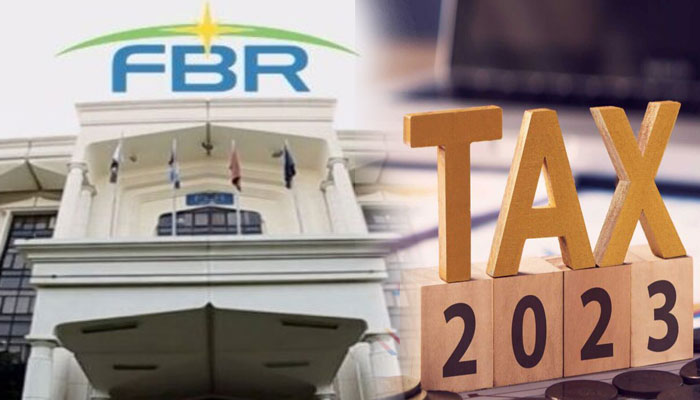FBR system shows 32pc drop in tobacco production
The Track and Trace System of FBR has shown decline in production of two major players of tobacco sector by 32% as overall production reduced to 43.9 billion sticks in 2022-23 against 64.7 billion in 2021-22
ISLAMABAD: The Track and Trace System of FBR has shown a decline in production of two major players of the tobacco sector by 32 percent as overall production reduced to 43.9 billion sticks in 2022-23 against 64.7 billion in 2021-22.
The production of Pakistan Tobacco Company (PTC) has faced a decline of 32 percent in FY23 and Philip Morris by 39 percent in FY23, if compared with the last financial year. However, the production of Khyber Tobacco has gone up by 48 percent in the last financial year 2022-23. The production of others having a negligible share faced a decline by 68 percent in production.
The FBR has made revenue collection of Rs62.9 billion during the first quarter (July-September) period of the current fiscal year. The FBR had materialised a revenue collection of Rs177.7 billion from tobacco sector in the last financial year 2022-23.
The FBR’s Project Director of Track and Trace Zaheer Qureshi said during a session, organised by Society for the Protection of the Rights of the Child (SPARC), on Increasing Tobacco Taxes to Ease Inflation here on Friday that the FBR undertook 1447 actions of enforcement of seizure with confiscation in the last financial year.
Another FBR representative said in his presentation that the tax machinery was undertaking arrest and prosecution in tobacco sector to discourage non-duty paid, counterfeit and smuggled cigarettes. When asked about number of arrests and prosecution, the FBR high-ups replied that they were developing a portal on which the details of enforcement actions taken by the FBR would be shared on daily basis from first week of next month.
During the session, Muhammad Sabir, Principal Economist of SPDC suggested the government to further hike the Federal Excise Duty (FED) by 19 percent. He hinted that, the government is actively exploring strategies to boost revenue, with the imminent possibility of a mini-budget in December. Increasing cigarette taxes emerges as a viable option to augment revenue and discourage smoking, thus yielding health benefits. According to SPDC estimates, a 19 percent tax increase could maintain affordability at levels observed in second half of the current fiscal year. This 19 percent increase in the Federal Excise Duty (FED) is anticipated to generate approximately Rs16 billion in tax revenues.
The Anti-Tobacco activist Dr Ziauddin Islam, former Technical Head of the Tobacco Control Cell at the Ministry of Health said that although the incidence of taxation was increased in the last financial year but it was still lower than the recommendation of the WHO. So there is still a room for increasing the FED on tobacco sector.
Akhtar Abbas, Secretary, Sales Tax Budget, FBR shed light on pressing issues such as the prevalence of non-duty paid, counterfeit, and smuggled cigarettes. He highlighted the challenges posed by a limited workforce, logistical hurdles, and an undocumented economy, which have made tax evasion and duty avoidance alarmingly accessible. These issues have further contributed to the high incidence of tax-related problems, resulting in negative externalities that harm not only public health but also the broader socio-economic landscape.
-
 King Charles Holds Emergency Meeting After Andrew Arrest: 'Abdication Is Not Happening'
King Charles Holds Emergency Meeting After Andrew Arrest: 'Abdication Is Not Happening' -
 Amazon Can Be Sued Over Sodium Nitrite Suicide Cases, US Court Rules
Amazon Can Be Sued Over Sodium Nitrite Suicide Cases, US Court Rules -
 'Vikings' Star Mourns Eric Dane's Death
'Vikings' Star Mourns Eric Dane's Death -
 Patrick Dempsey Reveals Eric Dane's Condition In Final Days Before Death
Patrick Dempsey Reveals Eric Dane's Condition In Final Days Before Death -
 'Heartbroken' Nina Dobrev Mourns Death Of Eric Dane: 'He'll Be Deeply Missed'
'Heartbroken' Nina Dobrev Mourns Death Of Eric Dane: 'He'll Be Deeply Missed' -
 Andrew Mountbatten-Windsor’s Arrest: What Happened When A Royal Was Last Tried?
Andrew Mountbatten-Windsor’s Arrest: What Happened When A Royal Was Last Tried? -
 Alyssa Milano Expresses Grief Over Death Of 'Charmed' Co-star Eric Dane
Alyssa Milano Expresses Grief Over Death Of 'Charmed' Co-star Eric Dane -
 Prince William, Kate Middleton Camp Reacts To Meghan's Friend Remarks On Harry 'secret Olive Branch'
Prince William, Kate Middleton Camp Reacts To Meghan's Friend Remarks On Harry 'secret Olive Branch' -
 Daniel Radcliffe Opens Up About 'The Wizard Of Oz' Offer
Daniel Radcliffe Opens Up About 'The Wizard Of Oz' Offer -
 Channing Tatum Reacts To UK's Action Against Andrew Mountbatten-Windsor
Channing Tatum Reacts To UK's Action Against Andrew Mountbatten-Windsor -
 Brooke Candy Announces Divorce From Kyle England After Seven Years Of Marriage
Brooke Candy Announces Divorce From Kyle England After Seven Years Of Marriage -
 Piers Morgan Makes Meaningful Plea To King Charles After Andrew Arrest
Piers Morgan Makes Meaningful Plea To King Charles After Andrew Arrest -
 Sir Elton John Details Struggle With Loss Of Vision: 'I Can't See'
Sir Elton John Details Struggle With Loss Of Vision: 'I Can't See' -
 Epstein Estate To Pay $35M To Victims In Major Class Action Settlement
Epstein Estate To Pay $35M To Victims In Major Class Action Settlement -
 Virginia Giuffre’s Brother Speaks Directly To King Charles In An Emotional Message About Andrew
Virginia Giuffre’s Brother Speaks Directly To King Charles In An Emotional Message About Andrew -
 Reddit Tests AI-powered Shopping Results In Search
Reddit Tests AI-powered Shopping Results In Search




